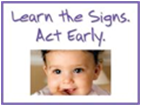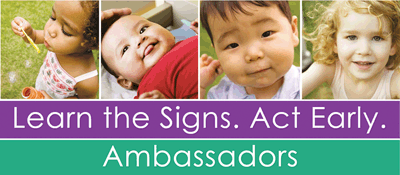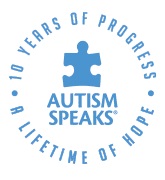Successful Strategies and Lessons Learned from State Systems Grantees
 The Act Early State Systems Grantees aim to strengthen their state and community systems for the early identification and improvement of coordination of early intervention services for children with signs of ASD/DD.
The Act Early State Systems Grantees aim to strengthen their state and community systems for the early identification and improvement of coordination of early intervention services for children with signs of ASD/DD.
Wisconsin State Team: Wisconsin's state systems goals include to reconvene the Act Early State Team and update the Act Early State Plan, and to Integrate Learn the Signs. Act Early. in more public health programs and provide training and technical assistance while developing a sustainability plan. New members of the tribal community and from families in Milwaukee brought new qualitative insight to the Act Early State Plan. Significant lessons learned that the state team is integrating include discovering community sites that are already successful and use their strategies for implementation, having a sustainable supply of Wisconsin customized LTSAE materials, and continuously defining the difference and link between developmental monitoring and screening.
New Mexico State Team: The state team's goal is to continue the work of the 2008 Act early summit by reconvening an Act Early State team to develop a comprehensive plan to align, coordinate, and promote statewide developmental screening programs for the early detection of ASD/DD and to enhance linkage to services through public awareness, professional development, and tracking of developmental screening activity and outcomes. Valuable lessons learned are to engage and integrate the unique talents of team members, and provide incentives that are meaningful and valuable to program participants.
Minnesota State Team: Minneapolis' Somali Autism Spectrum Disorder Prevalence Project aims to promote universal screening across culturally and linguistically diverse groups and connect them to early intervention services. The Somali ASD Prevalence Project has revealed cultural considerations including: professional language and terms may not translate into other languages, cultural views of disability vary greatly, and not all cultures receive information in the same way. Core lessons learned that can be applied to program planning are always ask the experts - ask your target audience what they need, spend time building trustworthy relationships - local organizations, parents, and providers are key to making other connections, and ask for input about messaging - conduct concept testing and pretesting of messages with your target audience.
Oklahoma State Team: The mission of the Oklahoma Act Early Autism Project is to increase statewide capacity for early identification of ASD and to improve access to needed services, especially for populations who may not have access to traditional services. Successful strategies include to identify agencies within a community providing local services to young children, work with the leadership to garner ongoing support, and provide services tailored to family needs.
Act Early Northeast Regional Developmental Screening, Referral and Response Conference
 The Act Early Ambassadors from the Northeast States have news to share on the Northeast Regional Developmental Screening, Referral and Response Conference to be held May 21 and May 22 in Hartford, CT. The conference will provide a unique opportunity to exchange national and state information on early identification, developmental screening, referral and response strategies and time for state teams to enhance state autism plans.
The Act Early Ambassadors from the Northeast States have news to share on the Northeast Regional Developmental Screening, Referral and Response Conference to be held May 21 and May 22 in Hartford, CT. The conference will provide a unique opportunity to exchange national and state information on early identification, developmental screening, referral and response strategies and time for state teams to enhance state autism plans.
Conference planners were excited to confirm key note speakers Paul Dworkin. M.D. and Ellen Amore, MS. Dr. Dworkin is the Executive Vice President for Community Child Health, Connecticut Children's Medical Center, Founding Director of the Help Me Grow National Center and professor of pediatrics at the University of Connecticut, School of Medicine. Ellen Amore, MS is the manager of KIDSNET, Rhode Islands Integrated Child Health Information System that contains preventive health care information for Rhode Island children.
Each state invited up to fourteen stakeholders committed to early identification, developmental screening, and referral and response activities. Breakout sessions are woven in to the agenda to allow time for state teams to gather and identify two to four strategies and outcomes to enhance their state autism plan. For more details please contact Stacy Aguiar, RI; Jen Doris, NH; Nancy Cronin, ME; Elaine Gabovitch, MA; Ann Gionet, CT; Deepa Srinivasavaradan, NJ; Janet Kilburn, VT.
Early Autism Intervention: Mobile Community Screenings in At-Risk Communities
 The simple, scientifically-supported fact is that early intervention can and does improve outcomes for children affected by autism. In 2014, the State of Florida legislators provided funding to Nemours Children's Hospital to screen, diagnose and treat children fewer than 6 suspected of having autism. As part of this project, Nemours has partnered with Autism Speaks and the State funded Center for Autism and Related Disabilities to perform free mobile community screenings in at risk communities in the Central Florida area. This provides access to families who may not have a primary care doctor. Children are screened and when necessary are sent on to community resources for assessment and treatment.
The simple, scientifically-supported fact is that early intervention can and does improve outcomes for children affected by autism. In 2014, the State of Florida legislators provided funding to Nemours Children's Hospital to screen, diagnose and treat children fewer than 6 suspected of having autism. As part of this project, Nemours has partnered with Autism Speaks and the State funded Center for Autism and Related Disabilities to perform free mobile community screenings in at risk communities in the Central Florida area. This provides access to families who may not have a primary care doctor. Children are screened and when necessary are sent on to community resources for assessment and treatment.
Within this program, a mobile unit and professional staff are deployed to libraries and popular retailers (Walmart and Dollar General) in underserved communities. Some screenings also take place at the Nemours Children's Hospital itself. Nemours' early intervention team, including a Neurologist, Psychologist and Behavior Analyst, along with community partners from Autism Speaks and Center for Autism and Related Disabilities (CARD) meet with families of children under 6 years of age. Age appropriate screening tools are employed, along with a brief clinical interview.
During the period from October 2014 through March 2015, 8 screenings events were held and 122 children were screened. 76% of the children under 6 screened failed the screening, either due to a suspicion of autism or some other developmental delay including speech. Upon failing the screening, the families are provided with critical information about where they can obtain more in-depth assessments and/or intervention. In addition, for those families where autism is suspected, Autism Speaks reaches out to the families to offer further information such as their autism tool kits. The team is currently following up with these families to track their ability to access necessary services.
For more information about the mobile community screenings, please contact Karen Bacharach at [email protected]
Learn the Signs. Act Early. Integrated into State of Indiana Library Systems
 Stephan Viehweg, the Act Early Ambassador in Indiana and Kathleen Daly, a LEND Trainee of the Riley Child Development Center-Indiana LEND are establishing a partnership with the Indiana State Library to disseminate LTSAE materials and messaging. In partnership with the state library, they will be hosting a seminar for children's librarians focused on child development, discuss the CDC's national campaign and how these materials could be useful for professionals as well as community consumers, and highlight one library program that may show promise in continuing to disseminate the CDC's LTSAE materials to child care providers and at-risk populations. This seminar will be offered as a continuing education opportunity for those that attend the session.
Stephan Viehweg, the Act Early Ambassador in Indiana and Kathleen Daly, a LEND Trainee of the Riley Child Development Center-Indiana LEND are establishing a partnership with the Indiana State Library to disseminate LTSAE materials and messaging. In partnership with the state library, they will be hosting a seminar for children's librarians focused on child development, discuss the CDC's national campaign and how these materials could be useful for professionals as well as community consumers, and highlight one library program that may show promise in continuing to disseminate the CDC's LTSAE materials to child care providers and at-risk populations. This seminar will be offered as a continuing education opportunity for those that attend the session.
In addition to the seminar, the Indiana State Library has agreed to catalog the CDC's materials in their online database system and provide other libraries across the state the opportunity to electronically link to the CDC materials, identifying that these materials are part of their print collection. The online resource information will give patrons direct access to the CDC's website where materials can be found and printed.
The Lighter Side of Autism
 Autism is a developmental disability usually seen by the age of three. Children with autism present with a variety of skills and deficits. In addition, there is a wide array of visible autism symptoms. The major signs include lack of eye contact, covering ears, walking on toes, staring, playing alone, and flapping arms. Symptoms serve as guides for pediatricians and child therapists to aid them as they explore a child's functioning and the possibility of an autism diagnosis.
Autism is a developmental disability usually seen by the age of three. Children with autism present with a variety of skills and deficits. In addition, there is a wide array of visible autism symptoms. The major signs include lack of eye contact, covering ears, walking on toes, staring, playing alone, and flapping arms. Symptoms serve as guides for pediatricians and child therapists to aid them as they explore a child's functioning and the possibility of an autism diagnosis.
When looking at the signs of autism it is vital to recognize that the symptoms include both deficits and excesses. In other words, children with autism may engage too little, or too much, in the given behavior. It is also important to note that each symptom includes an array of behaviors. Lastly, it is pertinent that we pay attention to the mild aspects of the symptoms.
With the efforts of major organizations, governmental agencies, and local groups there has been much success with autism awareness. However, there is a great need for making parents aware of the milder symptoms of autism. In celebration of Autism Awareness Month Abilities Unlimited LLC will be conducting a workshop, on April 25th, discussing the milder symptoms of autism. The event is free for parents and professionals.
Mild Signs of Autism
Children with mild autism may present with:
Odd facial expressions
Using the incorrect pronouns
Poor motor skills
Sensory challenges
Verbalizing inner thoughts
Issues recognizing voice tones
Obsession with certain topics
Challenges in reading body language |
Poor articulation
Feeding challenges
Monotone speech
Poor posture
Floppy body tone
Advance language
Unaware of danger
Speech delay/deficit |
For more information visit, www.abilitiesunlimitedtherapy.com
Written by Beverly Dabrio, MA, BCBA
Is It Autism and If So, What Next? A Guide for Adults
 Autism Speaks has published Is It Autism and If So, What Next? A Guide for Adults. The guide is designed for adults recently diagnosed with or who suspect they may have an autism spectrum disorder. The guide provides an overview of autism and associated conditions, information about diagnosis and next steps in accessing services, and resources regarding employment, support, and advocacy. This kit provides users with information so they can understand the disorder, and will hopefully clarify whether users should seek out a professional for a thorough evaluation.
Autism Speaks has published Is It Autism and If So, What Next? A Guide for Adults. The guide is designed for adults recently diagnosed with or who suspect they may have an autism spectrum disorder. The guide provides an overview of autism and associated conditions, information about diagnosis and next steps in accessing services, and resources regarding employment, support, and advocacy. This kit provides users with information so they can understand the disorder, and will hopefully clarify whether users should seek out a professional for a thorough evaluation.
The kit also walks users through next steps in terms of accessing services and provides them with critical information about rights and entitlements as an adult on the spectrum. There is also a list of helpful resources for users to find more information about next steps for the days and months following diagnosis.
Download the kit today!
Learn the Signs. Act Early. is Turning 10!
 Celebrate the Learn the Signs. Act Early. 10 Year Anniversary with us and help share Act Early birthday gifts! Click here to share free gifts with parents, early care and education providers, health professionals, and your networks. You can copy and paste the gift images and descriptions into your next eNewsletter, blog, Facebook, Pinterest or other web post.
Celebrate the Learn the Signs. Act Early. 10 Year Anniversary with us and help share Act Early birthday gifts! Click here to share free gifts with parents, early care and education providers, health professionals, and your networks. You can copy and paste the gift images and descriptions into your next eNewsletter, blog, Facebook, Pinterest or other web post.


